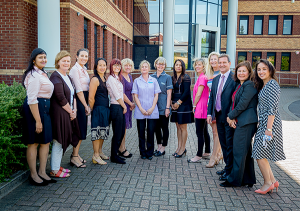What’s All The Fuss? Celebrating National Surrogacy Week

National surrogacy week runs from 1st – 7th August this year and we want to give you an opportunity to learn more about it.
This is a topic that can be surrounded by a lot of stigma. People may not understand the need for surrogates or may be under the impression that it is strange or shameful. But surrogacy is actually a very common procedure, and more and more people are using it every year.
In this blog post, we’ll discuss the meaning behind the term, why someone might need it, and how it works. We’ll also break down some of the myths surrounding surrogacy and allow you to continue the conversation around this important topic.
What Is Surrogacy?
Surrogacy is an arrangement between intended parents and someone with a uterus who agrees to carry a baby for them. This person is known as the surrogate. People can choose between traditional or gestational methods.
Traditional
This involves the surrogate being artificially inseminated with the father’s sperm. (This would also make the surrogate the baby’s biological mother as it is their egg being fertilised.) They will then carry the foetus to term and deliver it for the intended parents to raise.
Gestational
This is slightly different because an embryo is implanted using ‘in vitro fertilisation’ or IVF as it is more commonly known. The mother’s (or egg donor’s) eggs are fertilised with sperm from the father (or sperm donor) and placed into the uterus of a surrogate. The surrogate has no biological connection to the baby but will carry and deliver it for the parents.
Why Use A Surrogate?
A large part of national surrogacy week is understanding the reasons why someone might choose to go down this route. It’s still hugely misunderstood by many people and we do not see much information surrounding it in mainstream media.
Infertility
This is a huge barrier that leads many to choose a surrogate. Whether it’s low sperm count, endometriosis or ectopic pregnancy causing infertility – surrogacy removes a large part of the issue as well as some of the risks associated with miscarriage.
Age
By the time we hit menopause, the chances of falling pregnant reduce significantly. A large proportion of people who want to conceive at this age use younger surrogates as they are unable to fall pregnant or carry to term to due their age.
Same-Sex Couples
Another important aspect of National Surrogacy Week is celebrating the ability of all couples to conceive – regardless of sexuality or situation. Without the opportunity of conceiving naturally, this method has gained real popularity amongst the LGBT community.
It also allows at least one of the intended parents to share biological relations with the child if they would like to and are able to do so.
Medication
There are certain types of medication that can have severe side effects on a developing foetus. This would obviously be a huge risk to take if you desperately wanted children but surrogacy gives you the chance to avoid this completely. Similarly, asking someone to come off of their medication for nine months could be detrimental to their own health. It’s not always an option for people with chronic or long-standing conditions.
Personal Choice
This is not an exhaustive list of reasons people may choose to use a surrogate, but one people often forget is that the individual or couple would simply prefer to conceive this way. Infertility and health are not always the main reason for doing so. Whether it is to maintain their physique or continue working hard at their career, surrogacy is an option that everyone can consider.
Myths Surrounding Surrogacy
Now that we know a bit more about surrogacy, let’s dispel some of the myths that surround it.
“It’s So Expensive”
This is one of the most common things people say when they find out about surrogacy. Yes, it can be expensive and it’s currently not available on the NHS. However, there are many ways to finance it – whether through savings, loans or even crowdfunding.
It is currently against the law to pay the surrogate for their service, however, it’s perfectly legal to pay for all reasonable expenses along the way. This may include travel costs, loss of earnings, reimbursements or physical/physiological treatments.
It can also be cheaper to conceive via traditional surrogacy as you will not need to undergo fertility treatment of gestational methods.
“The Surrogate Will Be Attached To The Baby”
Whilst it is true that carrying a baby for nine months will create a bond between them, this doesn’t mean the surrogate will want to keep the child. In fact, most surrogates are mothers themselves and understand how difficult it must be to go through life not knowing if you’ll be able to have a child of your own.
It’s important to remember that the surrogate is carrying the baby for you and wants what’s best for you and your family. They will have no legal rights over the child once it is born. Part of national surrogacy week is remembering that surrogates are incredible people doing a very selfless thing for the intended parents – they do not always have ill intentions as we may see in films or TV shows.
“It’s So risky”
As with anything in life, there are risks associated with surrogacy. However, most of these can be mitigated by working with a reputable agency or fertility clinic.
The risks to the surrogate are usually minimal as they will undergo the same health screenings as anyone else who is pregnant. The main concern is usually to do with their mental health and emotional well-being – something that national surrogacy week and professional healthcare providers hope to address.
“You Won’t Be Able To Bond With The Baby”
This couldn’t be further from the truth! You would have been involved in every step of the pregnancy and will likely have a very close relationship with the surrogate.
After the baby is born, you will be able to spend as much time with them as you like and you may even be able to stay in the hospital room with the surrogate and baby if you wish.
How To Start The Process
Many people turn to friends and family. This is a great option as you already have a fantastic relationship built on trust. However, if this isn’t an option for you it will take some research to ensure you find the right surrogate for you.
Unfortunately, we do not offer the service at our clinic but there are plenty of organisations that can offer advice, resources and contacts.
- Surrogacy UK
- Brilliant Beginnings
- Childlessness Overcome Through Surrogacy (COTS)
- My Surrogacy Journey
- HFEA
You’ll be asked to decide a few things that will determine how the pregnancy moves forwards. Having an idea beforehand can make this less daunting.
It may be useful to draw up an agreement or think about the financial side of things. How much are you willing/able to reimburse? Also how much contact will you be having with the surrogate?
These are all important questions that national surrogacy week can help you answer alongside the professional advice available online and in clinics.
It’s important to remember that there are many people involved in the process and national surrogacy week is a time to celebrate them all. From the surrogate mothers carrying the baby to the clinics and agencies supporting you along the way – everyone plays an important role.
Join Us This National Surrogacy Week
There is no right or wrong answer when it comes to this method of conception. It’s a personal choice that should be respected much like the decision to have (or not have) children in the first place.
In light of this, we hope you will join us this national surrogacy week in celebrating this incredible topic and raising awareness for the incredible act of kindness that comes with it.
It’s natural to have many questions when you first start looking into surrogacy as an option, after all, it isn’t something that is talked about often.
So, if you’re considering surrogacy, or know someone who is, make sure to reach out and get informed. It could be the best decision you ever make.
What are your thoughts on surrogacy? Have you ever considered it? Share your story with us in the comments below or join the conversation on social media using the hashtag #nationalsurrogacyweek. We’d love to hear from you!








 traightforward discovering that assisted conception is required, in order to have a family. The information available can be overwhelming and daunting and, at times, it’s difficult to even know where to begin. Infertility most certainly has a language of its own. There’s also an element of hopelessness and despair, when realising that future dreams are dependent on doctors, nurses and medical science, coupled together with a big pinch of luck.
traightforward discovering that assisted conception is required, in order to have a family. The information available can be overwhelming and daunting and, at times, it’s difficult to even know where to begin. Infertility most certainly has a language of its own. There’s also an element of hopelessness and despair, when realising that future dreams are dependent on doctors, nurses and medical science, coupled together with a big pinch of luck.